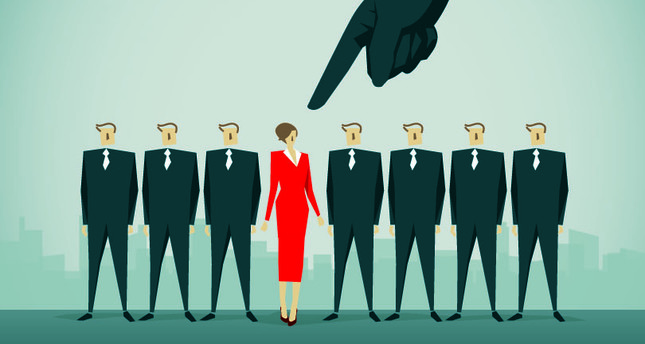
The “invisibility” of women politicians in the media is due to their small number, constant reluctance to appear in the media and frequent criticism, and the still patriarchal society that puts women in the foreground as wife and mother. On the other hand, their colleagues – politicians – also play a big role in the “invisibility of women politicians”. Together, they agree that the solution to this problem must be worked on in part by the media, party colleagues, but mostly themselves – BiH politicians.
According to a survey conducted in 2018 by the Association of BH Journalists, only 13.4 percent of women active in political life occupied the media space. The same research pointed out the problem of inequality of women in high positions in government, because such positions are usually held by men, and therefore are more often in the media space.
University of Mostar professor Daniela Jurčić points out that there are several reasons why women are treated less well in the media, especially because of the patriarchal-conservative society in which we live.
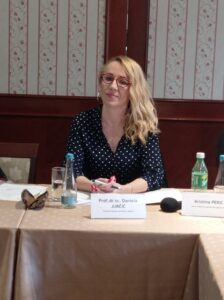
“Women are most often portrayed through motherhood, then what and how she wore them, and in BiH I noticed that the physiognomy of women is even commented on, while men do not mention anything,” says Jurčić.
She emphasizes that the stereotypical portrayal of women is omnipresent, that it is not necessarily related to the patriarchal Balkans, but that such stereotypes exist all over the world. Among numerous examples, she highlighted the case of Sarah Palin, a former governor of Alaska and a candidate for vice president of the United States.
“It was said that she would not be able to perform her duty well because she has five children. During that time, her husband was not mentioned in the media, as if her role was to raise children on her own, and her father did not have that role. Such cases, therefore, are not exclusively related to the Balkans, but in our country they are a little more represented because in BiH society women are “told” that they have a place in the house, to do what society has determined they should do, and that is to be mother and housewife. This is something that we as women should not allow, because we live in the 21st century “, emphasizes Jurčić.
The editor-in-chief of the Hercegovina.info portal, Kristina Perić, also commented on the “invisibility” of women politicians in the media, emphasizing that the media is often criticized for not giving enough space to women politicians.
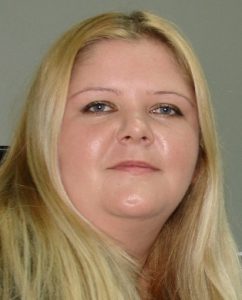
“How to give space to women politicians when they simply do not exist? Or, if you do find them, they don’t want to go public. The second question is, should women politicians be given space in the media just because they are women, or because they have something to say? From my perspective, for the presence in the media, the gender of the person who is involved in politics should not be important, but what and how he does in politics “, said Perić.
Oslobodjenje editor-in-chief Vildana Selimbegović says that this media takes care that “healthy” voices appear on their pages in public, and this applies to both women and men.

“It is disappointing that a large number of women justify their absence from politics with party disciplines and the imposition of party will. “Women politicians should be thought about critically, as well as their male colleagues,” Selimbegović believes.
Journalist Velida Kulenović stated that in the City of Zenica, out of 31 deputies, only three are women:
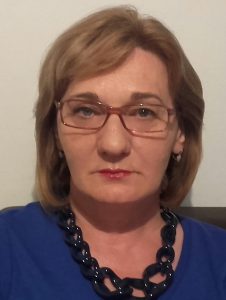
“In 2016, there were 5, and in 2012, even 7. Among the elected ministers, there is currently only one woman, and there is not a single woman mayor. Also, so far we have not had a prime minister’s wife. In the election processes so far, it was evident that the classic media were the best platform for presenting candidates. Today, however, there are social networks and various other platforms used for political marketing. Stereotypes in the media when it comes to representing women are extremely present. “Politicians are often victims of misogynistic attacks through social networks, and this trend is more and more present,” Kulenović believes.
Journalist Milanka Kovačević is of the opinion that many politicians are more lucrative in the field in which they work and follow a conformist approach, while the editor of the Bljesak portal Berislav Jurič asks how much politics wants to put women in key positions in government. He added that the media are not to blame for the fact that women do not present themselves better, and that they themselves very often avoid giving statements and interviews or do not know how to present their engagement in an interesting way.
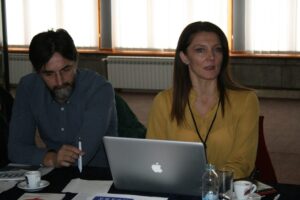
“The media cannot be blamed for what politics (does not) place. Which political leader has confidence in his colleague for, for example, participating in the debate on the Election Law? But at the same time, women in politics should not be humiliated – they do very responsible jobs ‘in the background’ and actually prepare materials and what politicians will say and present. “Women have a long way to go and we need to start from the parties because they must not be just” make-up “in politics”, concluded Jurić.
BN television journalist Sladjana Jasarevic also agrees with Juric, emphasizing that it is not a problem for the media to support women politicians, but that the task of the media is not to unconditionally support anyone, regardless of gender.
“So if women have no real interest in politics, that’s their problem. If the party does not allow them to express themselves and represent their ideas, then let them change the party. We are a patriarchal society, but women must fight for themselves and not expect to have an advantage just because they are women, “said Sladjana Jasarevic, a BN TV journalist.
However, the editor-in-chief of RGM, Faruk Kajtaz, reminded that the BiH society “has come a long way since the time when women in politics caused astonishment”.
“The insistence of the international community on fulfilling the so-called women’s quotas. But the situation is far from normal. We have not had a minister in the HNC government for a long time, we have 8 councilors in the City Council out of a total of 35, etc. However, although they are in the minority, they are very active and played an important role in electing the mayor of Mostar, “Kajtaz reminded.
On the other hand, Milica Pehar, HDZ BiH representative in the HNK Assembly and president of the Commission for Gender Equality of the HNK Assembly, emphasizes that she is still “up to women”.
“Women must have a goal, it is important to know what you want, to be educated. You have to have determination and attitude. In the end, we women raise men who will be husbands and fathers tomorrow, and our upbringing will greatly determine their attitude towards women, “said MP Pehar, while emphasizing that” the unwritten laws of patriarchal society still rule. “
However, she, as well as her colleague Adela Gosto, PMP councilor in the Mostar City Council and president of the Mostar City Council Commission, still believe that the media should write more and emphasize positive topics and content instead of “tabloid and sensationalist”.
“The media pays too much attention to what the woman is wearing, but to the very important messages and initiatives she represents, so her political engagement remains invisible,” Gosto said.
Analyzing the situation regarding the position of women in BiH society and their visibility in the BiH media, the president of the NGO “Novi put”, Abida Pehlić, pointed out that “unfortunately, the results are not encouraging at all.”
“Monitoring of five leading print media in BiH, which we did in 2019 within the project of the World Association of Christian Communications (WACC) in BiH, showed that, although the female population in BiH is larger, they are more inconspicuous in the media than men, with a strong emphasis the roles of mother and wife. The fact is that women have a very important role in BiH society, but it is often not taken seriously as much as the role of men in the same positions and that is what we need to work on, “concluded Pehlić.
She also emphasized that women themselves, due to the increase in violence in public space and frequent insulting comments that are permanently recorded on the Internet, decide to withdraw from the media space due to concerns about the reaction of conservative society, neighbors or family members.
For this reason, the media must not forget that the representation of women politicians in public can influence the way the public perceives them, and thus reduce their political power, or make it more difficult to win important political positions in government or the legislature.
Dragana Erjavec
This text was created within the project “Women’s Press Forum” funded by the Embassy of the United States of America in BiH. The contents of this text are the sole responsibility of the authors and the Association of BH Journalists, and do not necessarily reflect the views of the Embassy of the United States of America in BiH.



